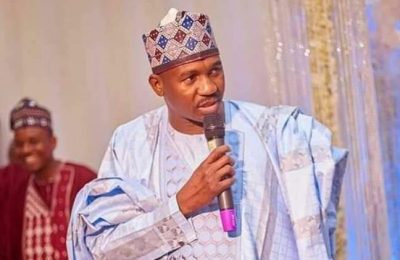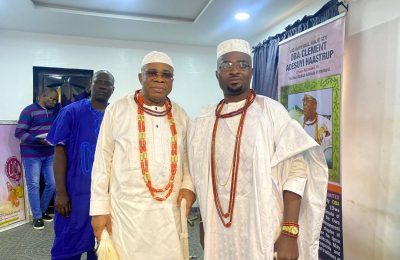

SAMPLE 1:
“I am here to inform our fathers of my decision to run for the position of the president of this country in 2023. What I need from our highly referred traditional rulers are their prayers and cooperation.” (I’m ready to get dirty, News Opera, 20 February, 2022)

I refer to the word referred which occurs in the following context: “our highly referred traditional rulers.” It shouldn’t stretch our imagination too much to understand that the word required in the context can’t be referred but revered. There are slight similarities between the two words, but they are not sufficient to occasion the malapropism in evidence here. According to the context, the lexeme occupying the slot under reference has its synonyms: honoured, respected, valued. These synonyms are the semantic equivalents of the word revered.
Let’s have the following sentences: 1) The teacher referred to his earlier instruction on the subject. 2) Readers are referred to the previous edition of the book. 3) Those requiring counselling may be referred to either a priest or a psychologist. 4) More serious medical cases are referred to tertiary health institutions. 5) Thieves who steal by using violent means are referred to as armed robbers. 6) After observing the patient for some time, the Doctor referred him to a psychiatric hospital. 7) The lecturer frequently referred his students to the library. 8) Twenty scholars referred to that article last year alone. 9) The preacher referred to different parts of the Bible. 10) The lecturer referred to himself as a professor several times in the course of the lecture.
From those sentences, it may be inferred that to refer to a person or thing is to mention them, direct people to them, to ask people to consult them.
Now read the following sentences: 1) The Judiciary is a revered institution in our society. 2) Professor Wole Soyinka is a highly revered scholar. 3) Traditional rulers are the revered custodians of our cultural values. 4) Books are revered both by the literate and the non-literate. 5) Religious leaders are revered members of our society.6) Wealthy people are revered in modern Nigerian society. 7) Farmers who produce food that we eat are not nearly as revered as the educated citizens. 8) In the traditional African society, virginity is revered. 9) Ability to engage in physical violence is revered among commercial drivers. 10) You should be careful not to disrespect our revered elders.
At any rate, the word revered should replace referred in the context under review.
Sample 2: “Governor Oyetola, who urged the members of the party to troop out in large numbers on Saturday for the party’s primary, noted that, with God on his side, he was confident of victory…(Osun 2022: over 150 PDP loyalists defect to APC in Ede Federal Constituency, Opera News, 18 February, 2022)
We note the expression “trooped out in large numbers.” The last part of the expression, in large numbers, is unnecessary. Why? Because the verb troop already entails a multitude of people.
It is more crucial, however, to note the difference between troop and troupe, two words often confused by some Nigerian writers. It is interesting that the two words, troop and troupe, have identical pronunciation. But apart from being spelt differently, they are as far apart semantically as any two words can be.
Now, the noun troupe is used to denote a group of actors, dancers or singers who perform together, moving from one place to the other. Please read the following sentences: 1)Led by a veteran musician, dynamic and entertaining, the troupe treated us to a thrilling performance that I had never seen in the last two decades. 2)In spite of its great performaces, the troupe always faces the problem of insufficient funding. 3)As the leader of our school’s cultural troupe, it was my duty to ensure that every performance was successfully carried out. 4)As a Youth Corps member, I organized a cultural troupe for the school where I carried out my primary assignment, a troupe, I’m told, is still active till today. 5)The dancing troupe is made up of ladies only as dancers and men as drummers. 6)The NTA troupe performs only during festive seasons. 7) A cultural troupe, formed, funded, and encouraged by the palace, is being arranged to entertain the guests. 8) The national troupe is very versatile, capable of entertaining guests with a medley of performances reflecting the diversity of the Nigerian cultures. 9) As a burgeoning group, the first performance of the troupe was at the National Theatre. 10) After about five performances, the troupe lost focus, became weak and died.
As we have noted, the verb form of the word troupe is very rare except in its very technical or professional sense. Here are examples of its usage in the verb form: 1)Hubert Ogunde was said to have trouped his plays to such distant places as the northern Nigeria. 2)The pioneer travelling actors like Oyin Adejobi trouped their performances all over the country, not because of the money they made from the performances, but because of the fulfilment they gave them. 3)To troupe plays requires considerable effort and dedication.
The word troop basically denotes a group of soldiers. It can be used in its singular or plural form. Let’s read the following sentences: 1)The Federal Government has deployed troops in the troubled states of the North East of Nigeria. 2)Now that peace is returning to the war-torn country, the foreign troops are being withdrawn. 3)The troops are on their way to Somalia on a peace-keeping mission. 4)Brigadier Taiye Ojopagogo is leading a troop to the zone to assist in quelling the civil unrest that is beyond the capacity of the police. 5)Member nations of the African Union have agreed to contribute troops towards restoring peace to a region that has been ravaged by war. 6)During the civil war, the Federal troops were said to have committed all sorts of atrocities, including rapes. 7) The troops were weakened by the activities of moles and deserters. 8) In disarray, the troops retreated and requested for reinforcement. 9) Fighting in a strange and difficult terrain the troops became extremely vulnerable. 10) The troops were led by an extremely courageous commander, who was sometimes erratic and demonstrated more courage than wisdom. 11) The enemy troops, in spite of their superior technology and other obvious advantages, were no match for our own. 12) Made of minors and women, the troops betrayed lack of discipline, commitment and focus. 13) The troops’ more serious enemy was hunger and not the enemy soldiers.
We have used the word troop as a noun in each of those sentences, and the sense has been that of soldiers in or ready for action.
But the noun can also refer to a group of people, non-soldiers moving to a place. Now read the following sentences: 1)We met a troop of young boys poaching animals and having fun. 2)There they were, a troop of angry, tired and frustrated retirees, seeking sympathy and justice. 3)We were distracted by the chatter of a troop of schoolchildren on their way to the football field. 4)It all happened in the middle of dry season when troops of women went to distant places in search of water. 5)The advertisement displayed in front of the building attracted a troop of job seekers, anxious and desperate, shouting themselves hoarse. 6)We saw a troop of tenants marching to the police station to report the misconduct of their landlord. 7) A troop of militant students blocked the road, protesting the lack of electricity.
Each of the seven sentences demonstrates the usage of the noun troop in its figurative sense. But the figurative sense can also be used in the verb form. Let’s consider the following sentences: 1)The villagers trooped out to see the white men who were visiting the palace. 2)Almost the entire town trooped out to welcome the president. 3)After the football match, spectators trooped into streets, leading to a terrible traffic jam. 4)The masses have been advised to troop out on the day of the election and vote for the candidate of their choice. 5) I expect the box office takings to be in hundreds of thousands in view of the rate at which spectators trooped into the cinema. 6)In those days when public execution of armed robbers was common, members of the public could be seen trooping out to watch the gory sights. 7)Following the series of armed robbery attacks, members trooped into the meeting called to discuss security issues. 8)It was the closing time and students trooped out of the school compound.
READ ALSO: LG chairmen, councilors to enjoy four-year tenure — Supreme Court








